Peter MALONE
Saturday, 18 September 2021 19:28
Master Gunfighter, The
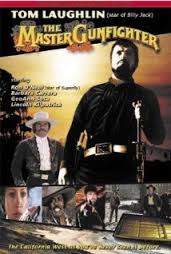
THE MASTER GUNFIGHTER
US, 1975, 121 Minutes, Colour.
Tom Laughlin, Ron O'Neal, Lincoln Kilpatrick, Barbara Carrera.
Directed by Frank Laughlin (Tom Laughlin).
Tom Laughlin, of Billy Jack fame and popularity, has taken his social themes into the period of colonial California. Once more he is the loner hero, righting wrongs and dealing out vengeance. (Unfortunately, his vocal acting ability is poor, acceptable as Billy Jack, but stilted from this bearded gunfighter.) The coastal photography is breathtaking. The Western conventions are presented in a brooding, tableau style, echoing rather accurately the Samurai story and films on which it is modelled. Action predominates, especially from the expert gunfighter and swordsman; but the film is certainly socially conscious and comes down very heavily on its targets: aristocracy, racism, an oppressive Church.
1. How entertaining was the film? Its social impact? An allegory of modern political and social conditions? A film of social protest?
2. The importance of colour, the visual presentation of the landscapes in such detail, the importance of the atmosphere of the sea and the seascapes, the music and the overtones of the Italian western styles? The portrayal of America, California, the Spaniards, the Indians, the blacks, the born Americans? An authentic atmosphere of California in the 19th century?
3. The importance of the initial narrative and its view of history and interpretation, fact and fiction? The effect of the moralising right at the beginning of the film and the tone it set for the interpretation of what was seen? The moralising for now? An allegory of America in the 70s by means of a presentation of violence and oppression and injustice in the early 19th century?
4. The narrative at the beginning stressing the atmosphere of legend and myth? The importance of the hero, the hero in legend, the memory as handed down? The importance of this particular hero at first countenancing evil, withdrawing from the world, changing, being challenged to protect, being a saviour, not wanting to rationalise a situation away? Was Finlay a convincing and admirable hero?
5. The episodic structure of the film, the importance of having the flashback about the massacre only in the middle, the importance of the flashbacks of memories, the build-up to the confrontation in the climax with the ships, with Paolo and Finlay? The momentum of the film? Suspense and involvement?
6. Comment on the opening of the film: the sunrise and then taken up with the sunset at the end? The stateliness of the procession, the sudden transition to massacre, the impact of this? The fact that most of this was not seen until the middle? The transition then to the empty village, the girl and the atmosphere of the crows, the visual presentation of menace? Fear? The anticipation of the explanation of this and its being shown later? Audience involvement in mystery and the sense of injustice?
7. The introduction to Finlay, the details of his character, his marriage (the visual presentation of this so much later in the film), the enigma of his leaving, his insistence of Paolo's promise not to massacre any other village, the presentation of his life of gunfighting and the stylisation of this, an atmosphere of violence in Mexico?
8. How important was the visual stylising of the film: the influence of the Italian western with a sense of pacing, close-ups at some length, concentration on faces, profiles, non-verbal expression? The influence of the Japanese Samurai films in the patterning of violence and the ritual presentation of action? What tone did it give to the film? How did it help to interpret the characters? As illustrated by Finlay's gunmanship and swordsmanship in Mexico? (The irony of the black agent looking on?)
9. The portrayal of Paolo, his land ownership, his Spanish status, his rationalising the situation of oppression of the Indians in order to pay the Americans? The beauty of his hacienda, the stateliness of his way of life, his relationship with his sister? His reliance on Maltese for administering violence? How villainous was Paolo in himself? As pressurised by circumstances and the Americans?
10. How interestingly did the film explore the theme of America, its taxation, Washington and its politics, the need for the Spanish to get gold, the fact that they were oppressed? The rationalization of Paolo and the others that they must oppress the Indians to save themselves? Two evils for good?
11. The presentation of Finlay's motives for returning? The confrontations in Mexico, the importance of his journey, meeting the girl from the village and the man who was considered a fool, the importance of his saving them, his becoming a saviour figure and they his followers and messengers? The preparations by Paolo and Maltese to ambush Finlay and prevent his return? The visual presentation of the journey on the horse. the landscapes, the seascapes?
12. The portrayal of the negro agent. the laconic enigmatic figure. his seeming to be able to be bought off by the gunmen, his help of Finlay during the siege, the details of his character, his confrontation with Paolo? Comment on the fact that the gain representative of American government was an African American?
13. The build up of the fire in the house and the siege of Finlay? As a high dramatic point, action sequence?
14. The introduction to Finlay's wife, her life at home after his departure, the pressures by Paolo, Paolo's memory of the wedding, the wife's memory of the wedding? Her visiting Finlay to bargain with him? Her willingness to compromise. his explanation of why this was impossible? The fact that she was converted to this point of view?
15. The dramatic build up in the preparations for wrecking the ship for gold, the plans about the beacons, herding the Indians into the church and the preparations for massacre, the various fights and Finlay's saving them?
16. The presentation of Finlay hanging, the saviour figure and his death? The importance of his wife helping him in his escape?
17. The visual presentation of the final duel as a ritual thing, the nature of swords instead of guns, Paolo's death?
18. The use of the Western convention of riding into the sunset? The listing of those who survived the film and those who died, the motivations for each? Finlay's followers, the black agent and his torture, Paolo, Maltese?
19. The strength of the exploration of human themes, friendship, love and loyalty, human conscience and responsibility? Heroism?
20. The exploration of social themes, the relationship of indigenous people with colonising people. the nature of society, rituals? The importance of the ritual on the beach by the Indians during the duel, its symbolism and significance?
21. The exploration of political themes, oppression, taxation, empire building?
22. There was much violence in the film, especially visually. Its necessity, effectiveness?
23. The parable and allegory effects on an audience, for understanding the world of the 70s, for doing something about it?
Published in Movie Reviews
Published in
Movie Reviews
Tagged under
Saturday, 18 September 2021 19:28
Masques
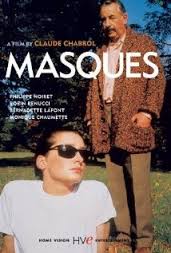
MASQUES
France, 1987, 100 minutes, Colour.
Philippe Noiret, Renato Renucci, Bernadette Lafont.
Directed by Claude Chabrol.
Masques continues the thriller career of Claude Chabrol, involved in the French New Wave of the late '50s with his psychological dramas, his writing about Hitchcock. During the '60s and '70s he completed a body of work, echoing Hitchcock but psychological drama in its own right. During the '80s, lie was more involved in television but made several thrillers including Masques in the mid-80s.
The setting is quite artificial and the plot does not bear thinking back on. However, the thriller is carried off with great style while on the screen. Philippe Noiret, veteran of so much French cinema, gives an excellent performance as the unctuous television host who really hates the old people in the programme that he comperes (a kind of elderly Perfect Match). However, his mask of charm covers a greed and a self-indulgence as he is ruthless in preserving the wealth that he has gained. His victim is the daughter of deceased friends whom he keeps in a state of sedation and fear. However, the brother of one of his victims arrives on the pretence of writing his biography and unmasks him, literally on the television set. There is an interesting gallery of characters. However, while the film is enjoyable, on reflection it is a slight crime thriller.
1. The work of Claude Chabrol, his perspective, interest in thrillers, psychology, human relationships, betrayal?
2. The French touch: the country estate, the French television station and programming? Editing and pace? Mood? Score?
3. The title: Media Masks, television, the compere, benign presence? His sleep and his wearing a mask? Catherine and her dark glasses? Roland and his penname? Literal and figurative masks? Unmasking?
4. Philippe Noiret and his screen presence: the opening, the television show, the elderly singers? His vanity. watching himself, delighted about his biography? Inviting Roland home? The car, Max? Collette attending on him, Max and Collette waiting at home? Patricia and Manu and their companionship, her masseur work? The joviality of the meals, Catherine and his care? The breakfast, the wines? The gourmet? His interviews with Roland? Coping, suspicions? Turning against him? The defiance by Catherine? His decision to murder her? The plan, the disposal of the body? His return to the city, the television and his unmasking? His final abusive words to the audience?
5. Roland Wolfe: in the audience, not applauding, planning the interviews, the trip, the house, his puzzle, the characters, meals? Catherine, the coat-hangers, her kissing him? The truth about his vanished sister? Snooping, Setting keys, covering up? Catherine's fainting? Giving her the information? Helping her, the sexual relationship? Tracking her down at the car yard, saving her, their exposing their host on television?
6. Max, driver, mute, cooking, his skills? His pretence and mask? The plan with Catherine, taking her to the car yard? Collette and her charm, her ruthlessness?
7. Catherine and her situation, age, ill, the dark glasses, cared for, impulsive with Roland, weak? Hearing the truth, her fainting? Growing stronger, defying Max and Collette, pretending, defying her patron, wanting to go into town, the car not going, gradually becoming victim, taken by Max and Collette, her being rescued from death?
8. Patricia and Manu, their place in the house, Patricia coming on strongly to Roland, their helping in the resolution?
9. Chabrol's attitude towards the old people on the television show, their performances, marriage, reminiscing, singing? The contrast with the compere?
10. The satire on television programmes, television making, and their style? Pink with hearts? Prizes of trips?
11. Understanding of human nature, greed, violence, love? Masks and unmasking?
Published in Movie Reviews
Published in
Movie Reviews
Tagged under
Saturday, 18 September 2021 19:28
Massacre in Rome
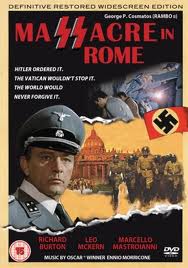
MASSACRE IN ROME.
Italy/France, 1973, 104 minutes, Colour.
Richard Burton, Marcello Mastroianni, Leo Mc Kern, John Steiner, Robert Harris.
Directed by George Pan Cosmatos.
30 years later, World War II, its battles, its struggles of conscience and its atrocities are still prominent features of our cinema. This Italian film takes a sombre look at the famous massacre of 330 men at Fosse Ardeatine. The film presents itself convincingly: the time pressures, the emotional pressures on Germans and Romans in mid 1944, the conscience and ideology problems, especially of Major Kepler who was in charge of the retaliation killings. Richard Burton gives a moving performance as the convinced militarist who loathes his task, but does it. Marcello Mastroianni is also moving in the unusual role of a Roman priest. A well made grimly historical film.
1. The interest of this film? As a war film, human document, religious overtones?
2. The critics condemned the film as 'poorly written and poorly made'. Were they justified? The Vatican condemned the film for its attitude to the Pope and the Church. Did it condemn it justly?
3. The fact that the film was a tribute to those killed? The quality of the film? That it was based on fact? The final list of those dead? Audience response to this kind of documentary reconstruction?
4. The communication of the war setting: justice and morality in war situations, Italy and the Germans, Rome as an open city, resistance and sabotage, Germany? National hatreds in war?
5. The picture of the Resistance? Audience sympathy directed towards the Resistance? The setting up of the massacre, the killing of the soldiers in the street?
6. General Maelzer and his arrogance? His immediate reaction for reprisals? His giving of orders? Keppler's questioning? The discussions about the number of the reprisals? Orders from Kesselring and from Hitler? Mae1zer as a symbol of German arrogance? Was he a fully developed character?
7. The film's focus on Keppler? His Nazi background, his humanity? His attitude towards orders and administration, even when he disliked his work? His negotiations with Kesselring and Mae1zer? The task of finding the names? Humanity versus duty? The confrontation with Father Antonelli and the change of attitude? Keppler's work with Caruso? The decisions about the names? Keppler's deciding to fire the first shot for morale purposes? The impact of the ending and Father Antonelli's turning round?
8. The character of Antonelli? How credible? His background as a religious priest? His religious attitudes? His friends in the Resistance, his own work in art? His negotiations with his superior? His superior's links with the Vatican? His attitude towards the list? His pleas for mercy? The give and take in his encounter with Keppler? His decision to give his own life?
9. The portrayal of the Roman officials, Caruso and the finding of the names? The criteria for the list? The seeking out of prison names, subversives? The attitude towards the Jews?
10. The presentation of Father Pancrazio and the Pope. The Pope's non-intervention and its reasons? At the time? Now?
11. The final reality of the list? Its necessity, the men lined up for death? The nature of reprisals, politics, war?
12. The place and the setting for death? The firing of the shots? The timing of several hours for the deaths? Audience response to the deaths, the list? The final impact of the film?
Published in Movie Reviews
Published in
Movie Reviews
Tagged under
Saturday, 18 September 2021 19:28
Mask
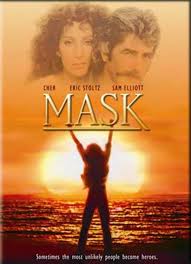
MASK
US, 1985, 127 minutes, Colour.
Cher, Eric Stoltz, Sam Elliot, Laura Dern.
Directed by Peter Bogdanovich.
Mask was a popular and critical success. Peter Bogdanovich, director of such films as What's Up, Doc? and Paper Moon, moves to a compassionate portrait of a 16 year old with a head deformity, Rocky Dennis says he is normal but looks weird. The film immediately reminds audiences of The Elephant Man.
The film is set in California in 1979?80 and has the gloss of that state. The setting is a bikie gang ? Rocky's mother Rusty, played by Cher in her Cannes Film Festival Award winning role, is a member of a gang. This gives the film a somewhat unrealistic air (the bikies are all very amiable). But the film shows Rocky at school and at a camp for the blind. On the whole, while much of the material is contrived, it avoids sentimentality, and elicits much feeling and compassion from its audience. Eric Stoltz is excellent as Rocky.
The film has a great deal to say to the wide audience.
1. The popularity of the film, its acclaim, awards?
2. Audience emotional response? Understanding? The American style and tone of the film? Universal impact?
3. The impact of its being a true story? Reality and unreality? Persuasive?
4. California in the '70s and 80s: the opening panorama of California, highways, traffic, the city? The bikie world? ordinary suburbia, the school, camp? Familiar settings ? for probing problem issues?
5. The title and its references to Rocky's face, its use throughout the film - especially as insult? A hurting experience for Rocky and his coping with it? His saying he was normal but looked weird? The film providing scientific and medical information about the disability, its cause, effects? The possibility of help or not e.g. plastic surgery? The effects on the victim? Ability to cope?
6. The introduction to Rocky - his name, Roy, and his habit of rocking? The first appearances, ordinary, the revelation of his face? His going to the headmaster and the effect on the people in the school, their manners, manner? Going to the doctor, the friendly nurse, the measurement of his face? The discussion of the symptoms and causes with the doctor? The pompous doctor and Rocky's knowledge of his life expectation? Going to school, the kids and their reaction? The less than warm welcome in the class in contrast in contrast to the welcome to the girl? Breaking the ice? Support of the teachers? Eric and his girlfriend becoming friendly with Rocky? Rocky helping people with studies? His telling of the Trojan War story and its acclaim? His watching the sports events? His achievement at school, intellectual capacity, success? The graduation and the awards? His potential future?
7. Life at home, relationship with his mother, her love, tensions, playing music, his posters, poetry? Their talking, her helping him to concentrate and get rid of his headaches? Yet their clashes, her not listening to the poem. continually going out, the drugs and his attitude? Gar and his support and friendship? The parties at home. the outings? Rocky as quiet, enjoying the bikies' company? Bike rides with Dozer? The infatuation with Eric's girlfriend, questions about sexuality? His mother bringing Lorrie for the night, their friendship, his courtesy, their discussions about depressions and happiness? The outing at the carnival with Gar? His grandparents' visit and going to the match? The headmaster offering the position as camp counsellor, his decision to go after the clash with his mother? Meeting Diana, infatuation, talk, sharing, colours, telling her the truth about his face? The reaction of her parents? His helping the kids? The group turning up to take him home, his mother off drugs? Ringing Diana and her parents blocking the calls? Going to see her? Ben as his friend, sharing hopes, the trip to Europe, the map with the pins? The breakdown of the friendship? Returning to school and reacting against the insults? The reconciliation with his mother, his quiet death?
8. The amiable bikies? Gar and his moving in and out, his style, tough, work, friendliness, support of Rocky, relationship with Rusty? The Blood Bank roughhouse? The bike riding? Tough attitudes? A sense of community? Dozer and his inability to talk but his congratulating Rocky? The going to the graduation, the parties at home? The women in the group, the men? Ben and the pressures of belonging to the group, wanting to return to his father?
9. Ben and his background, friendship with Rocky, the plan for the trip, his going back to Michigan and Rocky being hurt? Rusty looking on and letting them work out their friendship?
10. Eric and the people at school, their glamour, friendship, contrast with Rocky? Rocky transcending the suspicions of the class? Mr. Simms and his concern, support of Rocky? The sympathetic teachers? Camp authorities?
11. Diana and her beauty, blindness, the rapport between the two riding the horses, the discussions of colour, the feel of colour, the truth about Rocky's face and her feeling it, the reaction of her parents? The phone calls, the visit, the bond between the two? The dismayed girlfriend?
12. Rusty's parents and their visit, disapproval, the mother diplomatic and washing up, the father and his insults?
13. ordinary and extraordinary life? Ups and downs? The sweetness and warmth of Rocky's personality? The meaning of his life ? that it was better for him to have lived with his disability?
Published in Movie Reviews
Published in
Movie Reviews
Tagged under
Saturday, 18 September 2021 19:28
Mary of Scotland
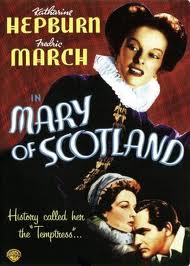
MARY OF SCOTLAND
US, 1936, 123 minutes, Black and white.
Katharine Hepburn, Fredric March, Donald Crisp, Florence Eldridge, Douglas Walton, John Carradine, Robert Barrat. Monte Blue, Moroni Olsen, Frieda Inescort, Alan Mowbray.
Directed by John Ford.
Mary of Scotland is one of the earliest sound costume epics. Directed by John Ford, a veteran of silent films and noted for his many westerns, it cane after his Oscar winning film, The Informer. Ford used Maxwell Anderson's famous play as the basis for his film, it is theatrical and opulent in its presentation of the Scottish court as well as that of Elizabeth. Katharine Hepburn gives quite a glowing performance as Mary, Queen of Scots. She had won an Oscar for Morning Glory in 1933. She was to win an Oscar for a historical performance in The Lion In Winter in 1968.
Fredric March is carefree as Bothwell. A cast of regular Fordian actors and actresses brings to theatrical life this period of history. Florence Eldridge, Fredric March's wife, is excellently vigorous in her portrayal of Queen Elizabeth ? in the style of Bette Davis who was to make Elizabeth prominent in her film with Errol Flynnof1939, The Private Lives of Elizabeth and Essex. There is a Max Steiner score and excellent use of sets and costumes. Another film version of Mary, Queen of Scots and her clash with Elizabeth was made by Charles Jarrott, Mary, Queen of Scots in which Vanessa Redgrave played the title role and won an Oscar nomination and Glenda Jackson repeated her TV performance as Queen Elizabeth.
1. An interesting and enjoyable historical spectacular? The historical spectaculars of the silent era and their influence on the films of the '30s? The importance of pageantry, theatrical presentation and acting?
2. The production values of this film ? sets, decor, costumes, the emphasis on pageantry?
3. The film as a Katharine Hepburn vehicle? Its place in her career? Her talent and presence in bringing Mary, Queen of Scots to life? Fredric March and his prominence at the time and his interpretation of Bothwell?
4. Maxwell Anderson as a playwright, the quality of his dialogue? John Ford and his tradition with westerns and action films? His interpretation of history and character drama? His film version of plays e.g. Sean O'Casey's Juno and the Paycock at this time, Eugene O'Neill's The Long Voyage Hone of 1940?
5. How accurate the representation of history, the presentation and interpretation of characters, situations? A feel for the history of Scotland, of England? How important is accuracy of detail?
6. The framework with Elizabeth as Queen of England, her fear for her power, the type of rule over England, the harshness of her character, her fears, the Virgin Queen, her relationship with her ministers, the fear of plots? Her intervention in Mary's rule? Her trying to influence Scottish nobles? The final confrontation with Mary? Her surviving while Mary died? The background of English, Scottish and French politics? The Reformation and Mary's Catholicism? Elizabeth and the Church of England? Questions of legitimacy and illegitimacy? How accurate a portrait of Queen Elizabeth?
7. The contrast with Mary, her arrival back in Scotland, the welcome, the nobles and their critique of her, her being used to the ways of France, her Catholicism and wanting to practise it freely, the confrontation with John Knox and what he stood for? The questions of her previous marriages, her marrying a noble? Beloved by the people? The importance of David Rizzio and his presence, advice? His access to the Queen? His songs? Darnley and his jealousy and the violence of Rizzio's death? The way that it was used by the nobles? The irony of Rizzio's advice for Mary to marry Darnley? The irony of Darnley's death? Mary as a victim of plots, her love for Bothwell and the way that it was used? Her finally having to escape, the imprisonment and the confrontation with Elizabeth, her trial and death? Her seeming failure compared with Elizabeth's success?
8. Bothwell as hero, a dashing nobleman, his character, skill in war, the confrontation with John Knox? The infatuation with Mary? His having to wait for her, his reaction to her marriage, his banishment? His return and the nobles' fear of his power? His love for Mary? His being compromised and the victim of the plot especially with the killing of Darnley? His being saved by Mary? The irony of his imprisonment and madness?
9. The presentation of the various Scottish nobles? their political power, their ideas, the welcome to Mary and the criticisms, the various plots, the Earl of Moray and his link with Elizabeth? Elizabeth and her ministers and their ambassadorial work in Scotland? Their reports on Mary and her beauty in the medal and Elizabeth's jealousy? The nobles and their stooping to Rizzio's murder and Darnley's?
10. Darnley as fop, his being used, his personal ambitions, participation in Rizzio's death, his own death?
11. Did the film explain Mary's ultimate failure and collapse? The judgment on her and her foolishness? Elizabeth and her callousness in imprisoning her? The contrivance of the sequence between the two and its dramatic conflict? The trial and Mary's standing firm? The end, the execution, the dignity of the ending? Katharine Hepburn and her strength?
12. A portrait of European history and politics, power, fear, religion, freedom? The private and public life of a monarch? Mary, Queen of Scots as a tragic figure?
Published in Movie Reviews
Published in
Movie Reviews
Tagged under
Saturday, 18 September 2021 19:28
Martin Luther
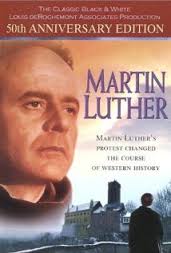
MARTIN LUTHER
US, 1953, 105 minutes, Black and white.
Niall Mac Ginnis, Alexander Gauge, Irving Pichel, Guy Verney.
Directed by Irving Pichel.
Martin Luther is a portrait of the 16th. century German reformer. The film is an American/ German co-production, sponsored by Lutheran groups. Historians and theologians were consultants ? including the celebrated ecumenist and theologian Jaroslav Pelikan. The film was shot on location in Germany.
British actor Niall Mac Ginness gives an interesting performance as Luther.
Production is by Hollywood actor-director Irving Pichel.
The film echoes the atmosphere of the '50s, a presentation of Luther for a world-wide audience. However, during the '60s and '70s with ecumenical discussions, the film seems to come from another period.
1. Interesting portrait of Martin Luther? Information? Explanation? Inspiration?
2. A US/ German co-production? The Lutheran historical and theological advice?
3. Black and white photography, re-creation of the period, use of German locations? A picture of the churches? The Reformation? The public and private life of Luther?
4. The screenplay and the overview of Luther's life, issues? The screenplay's use of quotations from Luther and from historical documents?
5. Niall Mac Ginnis persuasive as Luther: physical presence, religious style, psychology, theology? A reformer?
6. Audience knowledge of Martin Luther's life? The details chosen for the film: Luther as a student, his decision to enter the monastery Augsburg, his personal conflicts, his study, scripture, the visit to, Rome and its effect, his being on the Faculty at Wittenberg. the question of relics and Indulgences, the clash with Tetzel, the nailing of the theses on the door, the theological disputations with Eck, his being ousted from the monastery, the excommunication, the friendship of Philip Melancthon, the Diet of Worms, the patronage of Duke Frederick, Erasmus, his personal life and the relationship with Catherine von Bora? A sympathetic portrayal? Credible?
7. The film's portrayal of the origins of Lutheranism. the Lutheran Church, its spread?
8. The focus on Rome: the Church of Rome, its wealth, Leo X and his Cardinals, theological stances, Tetzel and his abuses, the selling of Indulgences? A basis for reformation?
9. Luther's theology, his personal struggles and conflicts, Augsburg, Wittenberg, the support of von Staupitz, the disputations with Eck, with Erasmus?
10. The political consequences of the Reformation? The Prince's supporting Luther? Duke Frederick's protection?
11. The issues of celibacy, Luther's leaving his monastery, the marriage with Catherine von Bora?
12. A portrait of Luther from the 1950s? The subsequent ecumenical dialogue?
Published in Movie Reviews
Published in
Movie Reviews
Tagged under
Saturday, 18 September 2021 19:28
Marseille Contract, The
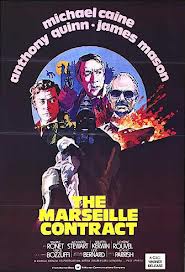
THE MARSEILLE CONTRACT
UK, 1974, 90 minutes, Colour.
Michael Caine, Anthony Quinn, James Mason, Alexandra Stewart, Maureen Kerwin.
Directed by Robert Parrish.
The thriller genre will probably go on forever. Most big budget thrillers are competent, entertaining and not very memorable, which is a description of this particular film. Its stars are a drawcard, although Anthony Quinn offers a variation on his ageing hero role and Michael Caine offers his same bland killer performance. James Mason as the suave villain is good. The plot centres on drug traffic. The most memorable sequences in the film are deaths: a pre credits car murder, Michael Caine casually pushing a man from a high construction site, several of the main characters dying in the shootout and the unobtrusive demise of the villain at a party.
1. How successful a thriller was this? Was it conventional or did it rise above its conventions? The role of deaths and danger, killing, the police, villains. the drug atmosphere, the locations in France?
2. Do you think the film gave any insight into the French scene of drug importation and smuggling? The interest of America in France for drug circulation? How important was this for this thriller?
3. Who do you think was the central character of this film? who focussed all the themes in himself? Why? Where did your sympathies lie?
4. How interesting a character was Ventura? Did you like him? The first meeting with him and his relationship to Matthew's wife, his desire to be in the field, his getting old, his reaction to the deaths of his men. the sequences with him in the office, and his secretary, the building up of vengeance in him? Did he let revenge overpower him or did he have a sense of justice? How was he hampered and helped by the law? His relationship with the French police? (And the irony of their later using him)? The sequences where he had informers and got information? How interesting a man was he? Of justice. violence, brutality?
5. The introduction of Johnny as a killer? His relationship to Ventura? Ventura's surprise at finding him as a killer? Why? How did Johnny justify himself? His morals? Killing merely as an occupation for earning money? His greed? His ability to study a killer? His infiltration of Brizzard's home? The importance of the car chase with Brizzard's daughter? (Was this too sensational?) His inability to see that he was being used? His desire then to murder Brizzard? The irony of all the discussion by the socialites about pollution and overpopulation? Did he change by the end? His desire to help Ventura? His death? Did you feel sorry for him in his death? (As contrasting with his pushing the killer off the top of the building?)
6. The presentation of Brizzard ? high society.. social charity, police protection, no moral standards, the mastermind and the use of power, complete inability to appreciate human life, his relationship with his daughter, style? His masterminding of evil from his rather aristocratic point of view? His relationship with his men? The irony of his death during the dance?
7. Calmet: as the typical second-in-command, brutal? What did he add to the film?
8. What was your initial response to the French police inspector? His cooperation with Ventura? Did you appreciate his strong emphasis on getting the killer and getting Brizzard killed? The irony when Brizzard knew everything and the policeman was criminal-minded? What was your final response to him? Were you surprised at his portrayal?
9. Did the women in the film contribute anything? Ventura's girlfriend and her grief at her husband's death, her relationship to her son? Brizzard's daughter and her relationship with Johnny? The socialites at Brizzard's home?
10. How successful dramatically were the incidents in the film? The police methods, Brizzard's way of life, Johnny's infiltration, the transporting and smuggling of drugs, the final shootout?
Published in Movie Reviews
Published in
Movie Reviews
Tagged under
Saturday, 18 September 2021 19:28
Marrying Kind, The
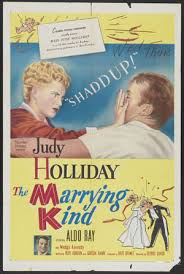
THE MARRYING KIND
US, 1952, 93 minutes, Black and White.
Judy Holliday, Aldo Ray, Madge Kennedy, Mickey Shaughnessy.
Directed by George Cukor.
The Marrying Kind is a pleasing fable about marriage and divorce. It was written by the husband and wife team of Ruth Gordon and Garson Kanin. Both are playwrights in their own right, The Actress, Born Yesterday. They combined on several screenplays especially for director George Cukor ? Adam's Rib, Pat and Mike and the present film.
Cukor had directed Judy Holliday in Adam's Rib and Born Yesterday, for which she won the Oscar. This was her next film. She was an expert dumb blonde comedienne in such
films as It Should Happen To You, The Solid Gold Cadillac, Bells Are Ringing. Her short career was terminated by her death from cancer when she was in her early forties.
This film introduces Aldo Ray. He was to put on much weight soon and move from being a hero in films to character roles. There are some excellent effects and lines in The Marrying Kind and it is a plea for marriage rather than divorce.
1. The significance of the title, the characterising of the characters, the pro-marriage themes, the presentation of marriage tensions, clashes, break up? The advocating of talk and counselling rather than divorce? Its presentation, humorously, of the battle of the sexes?
2. The film as a Judy Holliday vehicle ? as directed by George Cukor, her skill at subtlety in dumb blonde roles, a blend of humour and sensitivity? A typical American characterisation?
3. Black and white photography, the domestic atmosphere, apartments, post office, picnics etc.? The atmosphere of the early 1950s?
4. The framework of the screenplay: the divorce court, the 6 o'clock break, the judge and the discussion with the Keefers, the discussion, the flashbacks and their cumulative effect? The talking, airing of grievances, reconciliation?
5. The device of the voice-over and the ironies of the contrast between what was being said and what was seen by the audience? The effectiveness in establishing the characters and their points of view?
6. The particular devices to heighten characterisation and themes, Chester's dream sequence and its consequences, the radio quiz and the desperate attempt to answer and win the money, the ball-bearing skates test, the picnic with Florence singing and the transition to the death of their child, the story about the will and the inheritance, the bus breakdown and the immediate return?
7. The effect of the fragments of the marriage story and their cumulative effect: the delineation of character, the indication of attitudes and their changes, strengths and weaknesses? The background of the initial encounter, meeting, outings, build up to marriage? The honeymoon at Atlantic City? Chester at work in the post office, friendship, the gift of the ear plugs? Florence and her mother and sister and visitors looking over the apartment? Love, the first night at home and the talk, the abrasiveness. the possibility of clash and break?
8. The passing of the years and the realities of married life? The children and their love for them? Their love for one another, the fights? The party and Chester being late and the background of the ball bearings? The patenting of his invention and its failure, somebody stealing the invention? The quiz? The picnic and the effect of the death of the child? Chester's accident and his incapacity? The visits? The inheritance and the suspicions and accusations? The lack of talking and the reality of fighting?
9. The break up - whose fault? The contribution of each? The clash and the humour of everybody giving advice?
10. The love between Chester and Florence? Its development over the years, their needing help to reconcile? The happy ending with the judge achieving this?
11. How well portrayed were the characters, for the audience to identify with them in their situations while distancing themselves with the comedy? The picture of adults growing in relationship? Marriage and coping? Their growing in thinking, having dreams? Happiness, success and failure, grief, mistrust? The importance of the insertion of the dream sequence and the significance of the post office, authority, the President, Chester's feeling guilty about his dancing at the party and his being shot by an execution squad looking like his wife? How did this symbolise the film and its tone?
Published in Movie Reviews
Published in
Movie Reviews
Tagged under
Saturday, 18 September 2021 19:28
Married to the Mob
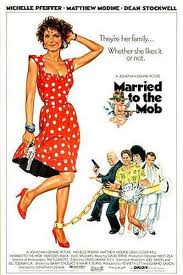
MARRIED TO THE MOB
US, 1987, 103 minutes, Colour.
Matthew Modine, Michelle Pfeiffer, Mercedes Ruehl, Dean Stockwell, Alec Baldwin, Joan Cusack.
Directed by Jonathan Demme.
Married to the Mob is a pleasant surprise. It is a New York gangster story but mainly in the suburbs. It is also done with the light and comic touch. Blend of comedy and satire. It was directed by Jonathan Demme.(Swing Shift, Talking Heads, Swimming to Cambodia). The offbeat musical score was composed by Talking Heads member David Byrne (actor in True Stories, composer of the score of The Last Emperor).
The cast is excellent and the film depends very much on Michelle Pfeiffer's clever performance as Angela (her roles in 1988 also included Dangerous Liaisons and Tequila Sunrise). Matthew Modine is suitably naive as the F.B.I. officer. Dean Stockwell received an Oscar nomination for his role as the family boss. Mercedes Ruehl is very good in a Lainie Kazan type strong-minded dominating wife.
The film, while humorous, is also serious in its themes about gangsters.
1. A pleasing blend of the comic and the serious about New York gangsters?
2. The New York suburbs, the lower east side of Manhattan, Florida? Authentic atmosphere? The use of songs? David Byrne's atmospheric score?
3. The title and its ironies, theme?
4. The prologue, the station, Frank and his associate, businessmen waiting for the commuter train, the fat man's late arrival, their standing back, sitting in the train, the photographing of the journey, perfectly ordinary, the tunnel and their shooting the fat man? Their returning home and ironic comments? Frank's encounter with Angela, his son and the gambling, the gun? The night out, praised by Tony, the encounter with Karen, Tony killing him? The setting up of characters, issues, moods?
5. The portrait of Angela: the title of the film? Angela getting her hair done, the other wives and her being aloof, friendship with Connie? Connie's demands? At home, Joey and the gambling, Frank and the gun, threatening the divorce? The news of his death, the funeral, the mother-in-law and her leaping into the grave? Tony and his kissing her? The F.B.I. and their theories, surveillance, photographing the kiss? Tony's gifts for the home and her giving them away? Moving, the new apartment and the area, the bath in the centre of the kitchen? Joey's reaction? Taking him to school, going for jobs, arriving too late, Mike watching her? Going to the restaurant and the peeping tom of the manager, her anger? Buying the chair, the encounter with Mike in the lift? Tony's arrival, continued pressures? In the street?? Connie and her observing? Going to the beauty parlour, talking with Rita, sincere in wanting to begin a new life, her education in the beauty academy but not graduation? Rita welcoming her, changing her hair?
6. Her new life, meeting Mike again, wanting the comment on her hair? Going to visit him and setting up the date? Joey and his school work, the question about the dinosaur? The evening out with Mike, enjoying it, the dancing, return, her gauche style, on the sofa, the night, her sincerity? Mike’s change of heart? The arrest, Rita's arrest, the interrogations, the truth about Mike, the pressure on her to finger Tony?
7. Her glamorous style in going to Tony, pretending, handling his doubts? Going to Miami, Connie at the airport, the flight? Giving Tony the ring with the microphone? Her pretence in Miami? The taking of Mike, the continued pretence, dropping it? Connie's arrival, Connie punching her, the return punch? The shoot-out and the ending? Mike coming for the haircut? The happy ending? Waiting till the end of the credits and seeing the couple together.
8. Tony as the family boss, style and dress, orders to Frank, at the restaurant, relationship with Karen, in her room. coming back and killing her. killing Frank? His fear of Connie? Arranging the funeral, kissing Angela. the gifts to Joey and herself? Going to the new apartment, the pressure on Angela? Out with his assistants, the car being ambushed, at the burger restaurant and his singing. his chauffeur being shot, his getting out and shooting the assailants? Angela and her approach, his doubts. going to Miami for the meeting, Connie at the airport and her scene. his trying to cover his tracks, the flight down, the suspicions on Mike, getting his thugs to get Mike. Angela and the ring, the set-up, the shoot-out, Connie's arrival and mayhem? Going to trial, the nightmare with Connie shooting him?
9. Connie as tough, lively, the wives, with Angela, dominating Tony, threatening Angela. waking up, rushing to the airport, the forgiving scene, the flight to Miami after hearing the honeymoon suite was booked, getting off the plane early, rushing to the hotel, the scene, the shoot-out, the punches? Shooting Tony in the dream?
10. The family men and their code, cavalier attitudes, wealth? The wives. their being together, avoiding knowledge of what was going on?
11. Mike and the F.B.I., young. naive, working with his partner, photographs, bugging the apartment? His theories, interpreting Angela? His disguises as the plumber. the encounter with Tony? Enjoying the date. the night with Angela, changing his attitude, the bosses, the set-up, the pressure on Angela? Disguise at the airport., in Miami, the thugs in the bar taking him to the apartment, the set-up, the shoot-out?
12. The F.B.I. and their surveillance. serious and set up?
13. The blend of the comic and the serious?
During the final credits all the scenes did not appear in the film though they relate to episodes in the film. From the cutting-room floor, these episodes fill in background, characters and situations. And there is a finale after all the credits finish.
Published in Movie Reviews
Published in
Movie Reviews
Tagged under
Saturday, 18 September 2021 19:28
Marriage Go Round, The
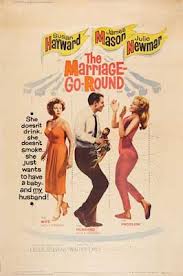
THE MARRIAGE GO ROUND
US, 1961, 98 minutes, Colour.
James Mason, Susan Hayward, Julie Newmar, Robert Paige.
Directed by Walter Lang.
The Marriage Go Round is a glossy, but laboured, romantic and sex comedy of the late '50s. It was adapted by writer-director Leslie Stevens from his own play. Stevens worked on several films with James Mason, including Hero's Island.
Susan Hayward and James Mason do their best with the sophisticated roles, but it is not their style. There is comic support from the statuesque Julie Newmar. This occasions a humorous reflection on permissive theory and practice and eugenics. There is a bright score by Dominic Frontiere. Alan Bergman and Marilyn Keith providing a song sung by Tony Bennett.
1. The appeal of the romantic sex comedy? of the late '50s early '60s? Impact in its time (e.g. English X Certificate)? Later?
2. Production gloss: colour, cinemascope? Musical score, song? Tony Bennett singing? Sophisticated and affluent background?
3. How evident that the film was based on a play? A satisfactory cinematic adaptation?
4. The status of the stars and their touch with this kind of comedy? (Or not?)
5. The university situation: lectures, birth and eugenics, marital bliss: theory and practice? American society in the 50s-'60s? Conventional behaviour - beginning to be challenged? Sweden and the stereotypes of Scandinavian permissiveness? The challenge to American standards?
6. The picture of the Delvilles: Paul and Content? As persons? Husband and wife? Their lifestyle, detail? The crisis with Katrine? Paul and the provocation, temptation? His response? Content and her reaction ? routing the attack? Reconciliation?
7. Julie Newmar's presence as Katrine - the large blonde Scandinavian type? Self-confident? Dogmatic? Attitudes, the visit? Her proposition? Her logical approach to emotions? Tempting Paul? Good theory ? bad practice? Her being defeated by Content?
8. The supporting cast and their styles ? serious touches, comic touches?
9. The film's themes reflecting attitudes in the '50s and '60s about marriage and the family? optimistic theory - and the qualifications of practices?
Published in Movie Reviews
Published in
Movie Reviews
Tagged under